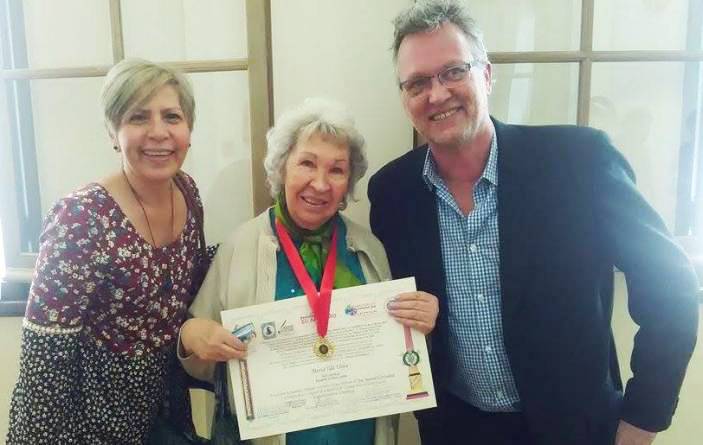
Maria Tila Uribe, an active member of HelpAge International and tireless advocate for the rights of the older people in Colombia, has won the International Prize for Peace and Defence of Human Rights, awarded by the Colombian Press. Here in her acceptance speech, she reflects on her life as a woman in Colombia.
At times like these, I get a lump in my throat and a film runs through my head, bringing back to life my dear friends and companions I have loved and admired and are with us no longer, or have left the country in more difficult times. I remember their names and they give me energy and joy, prompting me to leave behind in writings and debates some memory of the 20th century, from which I come.
I also remember the comrades who share knowledge and hope. Women and men, including my husband and partner, my four children, my grandchildren and my family, have been my support in difficult times, my daily company and also to a great extent, my “school of life”.
Life-changing experiences come back to me, experiences that made me who I am today, experiences that also help me justify my desire for peace and the defence of human rights.
How Colombia shaped me
First, women of my generation were born in a patriarchal and sexist Colombia. As a woman, I experienced this ancient culture brought by the Spanish conquerors, adventurers and noblemen that was in force in our land until the first half of the 20th century. As a child I was taught that the social, legal, educational and political system was only for the men. They created the laws, ruled the country and made the decisions.
The other side of the coin was the role of the reproductive women and housekeeper – the false virtues of submission and blind obedience with which we identified for lack of other options. These were the values historically given to males and females, putting in place power relations and creating conflicts in society, at work and within households. Within this world of historical limbo, girls and young women started asking questions that began to occur to us in that wonderful decade of the 60s.
Years of revolutions, of riots, of universalism that moved and enriched the world, of individual challenges that brought us Simone de Beauvoir, when waves of women start talking about fairness and respect for different ways of being, for different behaviour. That is to say, we began talking about human rights, and we understood that these rights belonged to everyone equally. In the 60s most women learned to not just say “amen” and rediscovered their voices, and their place in history.
On the other hand, in those years we were still feeling the effects of the violence of the late 40s: the dark bipartisan violence, as JE Gaitán described it. The people did not have two parties, they were broke up in two. The lives of many Colombians had entered into different and unknown phases. This was the beginning of worse years that would follow. So in all those years the debate, vocabulary and activities revolved around the danger, the anxiety, the curfew and the 45-year siege.
When the 70s came we found out what was happening in other Latin American countries like Chile, Argentina and Uruguay. Something similar happened here. Anyway, it’s a long story, and the older a Colombian is, the more experience they have of displacement, exile, refugees and migration. It is for all this that I long for peace.
Moving forward to a better future
I want to finish by saying that many people of my generation survived the armed conflict and were able to overcome it so that we did not keep suffering. There are many direct and indirect victims – we want to build on our experiences.
Finally, I have some messages for young people that I gathered during workshops and round tables with older people:
- We hope that you will learn rescue skills and develop the aptitude to bring about change.
- We want you be spokespersons and visionaries for peace.
- We recommend you learn about the past so you can prevent Colombian history repeating itself.
- We recommend you follow your dreams and build utopias.
- We would like to see you support and enrich solidarity.
- And we want you to know that the Colombian world was, is and will be difficult, so if you really want to make a change to improve your environment and your country, you will need to fight to the end.
